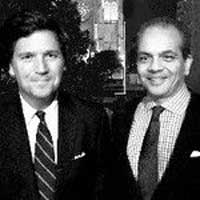We just had riots from coast to coast. Downtown Seattle is currently a lawless zone under the control of anarchists. It may be time to start asking what's going on in our country. People are not happy. The national unrest started with the brutal killing of George Floyd by a Minneapolis police officer, but it is not solely about police brutality or race. People on the left and on the right are unhappy about a host of issues. Maybe now that it has become this bad, we can stop pretending otherwise.
The first sign of unrest on the right was the tea party grassroots rebellion against the establishment. The second sign was the election of President Donald Trump. The most shocking part of Trump's win was how little self-reflection it generated among those in power. There was definitely bellyaching about what a whack job Trump was. There were also a ton of excuses.
My favorite excuse was that Trump only won the nomination because too many establishment figures were in the field, dividing the establishment vote -- which ignored the fact that the establishment vote was well under 50% of the total vote almost the entire time. The primary's leaders were Trump (anti-establishment), Sen. Ted Cruz (anti-establishment) and Ben Carson (anti-establishment). Trump's election was a fundamental rejection of the established political Republican order, yet nobody spent any considerable time asking why that happened.
On the left, Joe Biden just won the Democratic nomination, but Sen. Bernie Sanders, an avowed socialist, was right behind him. Biden, formerly a more moderate Democrat, had to pander to the far left on issues like open borders and socialized medicine in order to stave off his more radical challengers. Obama administration policies popular just a few years before were vilified during the primary.
So, how did both parties grow so disillusioned with the state of our country, and what can we do to fix that? I don't have all the answers, but I do have some suggestions on where to start.
First, we need our leaders to start telling the truth. And the truth is our system is not working for far too many Americans. A system that satisfies the needs of its people would not see such upheaval. The very wealthy and the large, international corporations are faring better than ever. Both these groups have benefitted from automation, trade and immigration, all of which bring societal benefits. The question we often ignore is what are the downsides that each brings as well, and what do we do about it?
There is little doubt that income inequality has risen drastically in our country. Automation, trade and immigration have helped those at the top flourish while taking jobs away from many others. When you throw in skyrocketing health and education costs, the average American's take-home pay has not increased significantly in years.
Our political leaders have not had any real, substantive debates about these issues. Washington is thoroughly dominated by large companies. There is nothing wrong with companies or individuals banding together to petition their government. In a system where the government holds so much regulatory power, we would be in trouble if we didn't allow the petitioning of our government. However, in an increasingly balkanized country where the spoils of our system are so clearly flowing in one direction, it is a problem when Congress essentially works in a tryout role for the various lobbying interests around Washington. This breakdown in our political system becomes more acute when we acknowledge that what benefits large companies does not necessarily benefit average Americans. When Washington's agenda no longer lines up with America's agenda, we end up with serious problems.
The second step to finding solutions is for people to start talking -- and, more importantly, listening -- to one another again. If you stop speaking with those outside your political bubble, it becomes much easier to demonize them.
The issue of the day is police reform. There are numerous reform ideas on the agenda. The majority of police officers are good people trying to do their best in a difficult job. That doesn't mean there aren't bad police officers. We should look at reforms, but oddly, one of the most needed reforms is not part of the current debate.
Police union collective bargaining agreements add protective processes that hinder the disciplining or dismissal of bad officers. Due process is important, but once a bureaucracy is burdened by a level of process that prevents effective discipline, it needs reform. Reforming this labor arrangement and these collective bargaining agreements is anathema to everything the left believes in. But these public sector union deals are very different from the traditional union notion of workers banding together against company owners. Police departments are hired by cities, states and towns. Officers' interests are protected by our political system. We can't have a system where officer discipline is neutered by collective bargaining rights. The left must be willing to take a look at this area as part of any reform.
The right should reexamine their sacred cows as well. When your country is in the ICU -- and does anyone really think we aren't? -- you throw out your ideological purity and find solutions that may work. That's the moment we find ourselves in now. We all need to get on with it if we are to have any hope of recovery.
----------------------
Neil Patel co-founded The Daily Caller, one of America's fastest-growing online news outlets, which regularly breaks news and distributes it to over 15 million monthly readers. Patel also co-founded The Daily Caller News Foundation, a nonprofit news company that trains journalists, produces fact-checks and conducts longer-term investigative reporting. The Daily Caller News Foundation licenses its content free of charge to over 300 news outlets, reaching potentially hundreds of millions of people per month. To find out more about Neil Patel and read features by other Creators writers and cartoonists, visit the Creators website at www.creators.com
COPYRIGHT 2020 CREATORS.COM

















